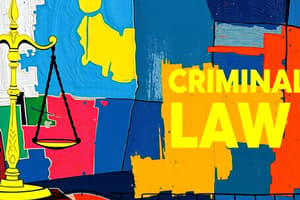Podcast
Questions and Answers
Qual é o elemento essencial que se refere ao estado mental do réu no momento do crime?
Qual é o elemento essencial que se refere ao estado mental do réu no momento do crime?
- Culpabilidade (correct)
- Tipicidade
- Ilicitude
- Conduta
O que afirma o princípio da legalidade no Direito Penal?
O que afirma o princípio da legalidade no Direito Penal?
- Um ato não pode ser considerado crime se não houver uma lei que o proíba. (correct)
- O réu é considerado culpado até que se prove o contrário.
- Qualquer crime pode ser julgado independentemente da sua gravidade.
- Os penas devem ser ajustadas ao crime cometido.
Qual destas opções NÃO é um dos elementos necessários para estabelecer um crime?
Qual destas opções NÃO é um dos elementos necessários para estabelecer um crime?
- Tipicidade
- Imputabilidade
- Reabilitação (correct)
- Culpabilidade
Quais tipos de crimes são classificados pela gravidade?
Quais tipos de crimes são classificados pela gravidade?
Qual desses princípios garante que ninguém pode ser julgado duas vezes pelo mesmo crime?
Qual desses princípios garante que ninguém pode ser julgado duas vezes pelo mesmo crime?
Qual das seguintes sanções pode ser imposta como uma pena no Direito Penal?
Qual das seguintes sanções pode ser imposta como uma pena no Direito Penal?
O que é o conceito de 'conexão' no Direito Penal?
O que é o conceito de 'conexão' no Direito Penal?
Qual a importância do princípio da presunção de inocência?
Qual a importância do princípio da presunção de inocência?
Qual é o enfoque do Direito Penal ao lidar com a conduta criminosa?
Qual é o enfoque do Direito Penal ao lidar com a conduta criminosa?
Qual das opções define a 'ilicitude' em termos de Direito Penal?
Qual das opções define a 'ilicitude' em termos de Direito Penal?
Qual é a principal função do Direito Penal?
Qual é a principal função do Direito Penal?
Qual das opções a seguir é uma fonte do Direito Penal?
Qual das opções a seguir é uma fonte do Direito Penal?
O que caracteriza o conceito de 'tentativa' no Direito Penal?
O que caracteriza o conceito de 'tentativa' no Direito Penal?
Como o Direito Penal se relaciona com o Direito Civil?
Como o Direito Penal se relaciona com o Direito Civil?
Qual dos seguintes elementos é considerado crítico para alguns crimes?
Qual dos seguintes elementos é considerado crítico para alguns crimes?
Qual é um dos procedimentos centrais no processo penal?
Qual é um dos procedimentos centrais no processo penal?
O que caracteriza a 'participação' no contexto do Direito Penal?
O que caracteriza a 'participação' no contexto do Direito Penal?
O que são 'códigos penais'?
O que são 'códigos penais'?
Qual é o impacto do Direito Penal na sociedade?
Qual é o impacto do Direito Penal na sociedade?
Qual é a definição de 'direitos do acusado' no processo penal?
Qual é a definição de 'direitos do acusado' no processo penal?
Flashcards
Direito Penal
Direito Penal
O ramo do direito que define crimes e punições, estabelecendo regras para crimes e suas penalidades.
Culpabilidade
Culpabilidade
O estado mental do réu no momento do crime, crucial para determinar a responsabilidade criminal.
Princípio da Legalidade
Princípio da Legalidade
O princípio de que um ato só pode ser considerado crime se for definido como tal por lei.
Conduta
Conduta
Signup and view all the flashcards
Tipicidade
Tipicidade
Signup and view all the flashcards
Ilicitude
Ilicitude
Signup and view all the flashcards
Culpabilidade
Culpabilidade
Signup and view all the flashcards
Imputabilidade
Imputabilidade
Signup and view all the flashcards
Conexão
Conexão
Signup and view all the flashcards
Princípio da Proporcionalidade
Princípio da Proporcionalidade
Signup and view all the flashcards
Lei Constitucional
Lei Constitucional
Signup and view all the flashcards
Código Penal
Código Penal
Signup and view all the flashcards
Jurisprudência
Jurisprudência
Signup and view all the flashcards
Procedimento Penal
Procedimento Penal
Signup and view all the flashcards
Elementos do Procedimento Penal
Elementos do Procedimento Penal
Signup and view all the flashcards
Conhecimento (Conhecimento)
Conhecimento (Conhecimento)
Signup and view all the flashcards
Tentativa
Tentativa
Signup and view all the flashcards
Participação
Participação
Signup and view all the flashcards
Relação com outros Ramos do Direito
Relação com outros Ramos do Direito
Signup and view all the flashcards
Study Notes
General Concepts
- Direito Penal is the branch of law that defines crimes and punishments. It establishes the rules for what constitutes a crime and the appropriate penalties.
- It addresses the social harm caused by criminal acts and aims to protect society from such conduct.
- Central to Direito Penal is the concept of culpabilidade (culpability), essential for determining criminal responsibility, referring to the defendant's mental state at the time of the crime.
- The principle of legality (nullum crimen sine lege) is fundamental; an act cannot be considered a crime unless explicitly defined as such by law.
- The State holds a monopoly on the use of force in imposing penalties, ensuring accountability through established processes.
Elements of a Crime
- Several elements are required to establish a crime:
- Conduta (conduct): A voluntary act or omission.
- Tipicidade (legality): The act corresponds to a type of offense defined in law.
- Ilicitude (illegality): The act is not justified or excused by law.
- Culpabilidade (culpability): The accused had the required mental state (mens rea) and was able to understand and control their actions.
- Imputabilidade (capacity): The individual was capable of understanding the wrongfulness of the act and conforming conduct to the law.
- Conexão (linkage): The act directly led to the particular criminal harm.
Types of Crimes
- Crimes are classified by:
- Seriousness (felonies, misdemeanors).
- Subject matter (crimes against property, crimes against the person).
- Nature of the act (intentional, negligent).
Principles of Criminal Law
- Guiding principles of Direito Penal include:
- Proportionality (punishment fits the crime).
- Individualization (specific circumstances are considered in each case).
- Legality (as mentioned before).
- Presumption of innocence (the accused is innocent until proven guilty beyond a reasonable doubt in a fair trial).
- Double jeopardy (no-one can be tried twice for the same crime).
Criminal Proceedings & Penalties
- Criminal proceedings include investigation, arrest, indictment, trial, sentencing, and possible appeals.
- Penalties can include imprisonment, fines, community service, and other sanctions.
- The process prioritizes protecting the accused's rights (procedural fairness).
Sources of Criminal Law
- The legal foundation of Direito Penal comes from:
- Constitutional Law (fundamental rights and limitations on state power).
- Criminal Codes (specific legal codes defining crimes and punishments).
- Case Law (court decisions interpreting and applying the law).
Criminal Procedure (Procedimento Penal)
- This outlines the steps and legal processes in investigating, prosecuting, and trying criminal cases.
- Key elements include investigation, arrest, bail, search and seizure, rights of the accused, and court hearings.
Relation to other branches of law
- Direito Penal interacts with:
- Civil Law (compensation for harm).
- International Law (transnational crimes).
- Administrative Law (regulatory offenses).
Specific Concepts
- Conhecimento (knowledge) is crucial in some crimes, requiring awareness of wrongdoing, not just the act itself.
- Tentativa (attempt): A started but incomplete criminal act, often considered a crime itself, potentially with reduced punishment.
- Participação (participation): Various forms of involvement in a crime.
Conclusion
- Direito Penal is a complex legal field vital for order and justice in society.
- Understanding its principles and procedures is important for those involved in the justice system and citizens' rights and responsibilities.
Studying That Suits You
Use AI to generate personalized quizzes and flashcards to suit your learning preferences.






